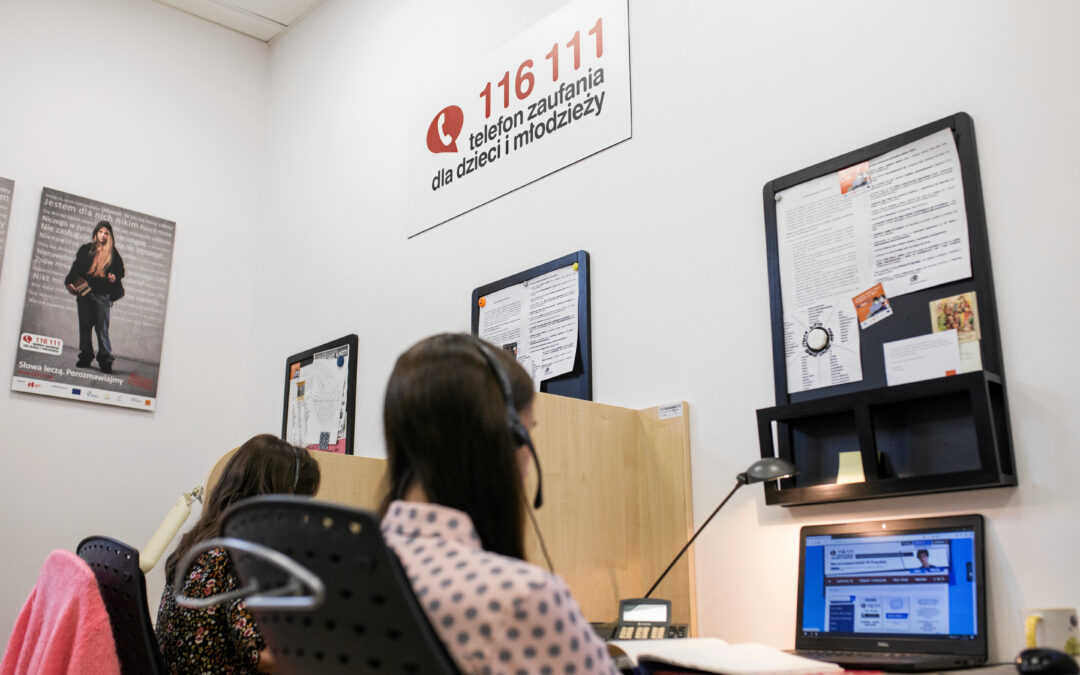Around 1.7 million zloty (€375,000) from 34,000 donors has so far been raised in less than two days to save a helpline for children and youth whose state funding has been withdrawn. The NGO behind the service says that young people need support more than ever amid the pandemic.
The free “Helpline 116 111” was founded in 2008 as part of Poland’s obligations upon joining the European Union. Since then, it has answered over 1.4 million calls. Last year, the calls it received led to 800 interventions.
“That is two children saved a day,” one of its representatives, Jolanta Zmarzlik, told TVN24. “We’re talking about situations in which a young person has just informed us of their intention to take their own life.”
Monika Sajkowska, head of the NGO that was approved by the interior ministry to run the service, says that in the past, state grants covered between 30-60% of its annual budget. But, after 2016, that figure fell dramatically, and has subsequently been no higher than 6%.
Then, late last year, Sajkowska’s organisation, the Dajemy Dziecom Siłę (We Give Children Strength) foundation, learned that its state funding would be stopped altogether in 2022.
On Monday, the NGO sent an appeal to the prime minister for the government to provide support. They stressed that the helpline is “an important resource for remote psychological help for the youngest citizens of our country”, especially at a time of “deteriorating mental health and massive social problems triggered by the pandemic”.
The letter pointed out that other EU countries provide substantial state funding for analogous child helplines. Bulgaria and Luxembourg pay for 100% of the costs, while in Portugal and the Czech Republic the figure is 60%, and in Denmark it is 13%.
In response to the NGO’s call for support, a businessman, Aleksander Twardowski, launched a crowdfunding campaign on Monday afternoon. As of this morning, his fundraiser had gathered around 1.7 million zloty from 34,000 donors, with donations continuing to come in.
Among those to promote the campaign was Marek Belka, a former prime minister and now an opposition MEP. Belka criticised the ruling Law and Justice (PiS) party for “taking money away” from the helpline and encouraged people to donate to the crowdfund or directly to the NGO.
Na szczęście dobrych ludzi jest więcej, a pomóc nie jest trudno. Można np. wziąć udział w zrzutce (link) lub wpłacić bezpośrednio na stronie fundacji. Tam gdzie nie działa państwo PiS pokażmy, że działa państwo obywateli.https://t.co/eCkPC1hDcwhttps://t.co/gdedWc7nQX
— Marek Belka (@profMarekBelka) January 17, 2022
Aleksandra Lewandowska, a child and youth mental health consultant, told TVN that the anonymity of the helpline is what makes it so important and widely used by young people. “It’s easier for them to reach out for help or share difficult personal information with a stranger,” she noted.
The NGO behind the helpline employs 65 psychologists and has 14 interns – graduates or students of psychology – who answer the phone at all times of the day. They estimate, however, that they are currently able to respond to only about a quarter of all the calls they receive on the helpline.
We Give Children Strength (previously called Dzieci Niczyje, or Nobody’s Children) has operated since 1991 and is the biggest organisation in Poland providing help for young people who are victims of violence. It publishes reports on child wellbeing and offers training and support for parents and teachers.
Meanwhile, the office of Poland’s commissioner for children’s rights last year concluded an agreement with the health ministry to run its own, separate helpline for young people, 800 12 12 12. It initially operated only in office hours but has recently extended its functioning and is now available around the clock.
In response to this week’s news that “Helpline 116 111” had lost its funding, deputy health minister Waldemar Kraska said that his department considered it better for the service to be provided by a state institution like the children’s rights commission, reports Dziennik Gazeta Prawna.
The pandemic has made the need for support for children and youth even more urgent. According to police statistics, between January and the end of November last year, 1,330 people aged 7-18 attempted suicide, with 119 of those attempts fatal. By comparison, in 2020 there were almost 500 fewer attempts.
Experts note that the true numbers might be much higher, as the cases of suicide attempts are underreported. Last year, the government announced 220 million zloty of additional funding for children’s mental health.
Poland’s mental health care system also faces a number of structural problems. The state audit office revealed that, in 2020, five of the country’s16 provinces had no psychiatric wards for people under 18 at all.
A study published last year by the OECD found that Poland has one of the highest suicide rates among young people in the European Union, as well as the lowest number of doctors in proportion to population. A UNICEF report ranked Poland 31st among 41 developed countries in an index of child wellbeing.
Main image credit: Adam Stepien / Agencja Wyborcza.pl

Agnieszka Wądołowska is deputy editor-in-chief of Notes from Poland. She is a member of the European Press Prize’s preparatory committee. She was 2022 Fellow at the Entrepreneurial Journalism Creators Program at City University of New York. In 2024, she graduated from the Advanced Leadership Programme for Top Talents at the Center for Leadership. She has previously contributed to Gazeta Wyborcza, Wysokie Obcasy and Duży Format.




















